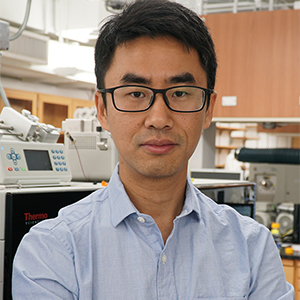Faculty Spotlight: Xiaoyu Zhang

Xiaoyu Zhang, Assistant Professor in Chemical Biology and Therapeutics, joined the Department in January 2022. Born in Shenyang, China, he obtained his bachelor’s and master’s degrees at Zhejiang University. He then moved to the US for a PhD at Cornell University and postdoctoral training in Chemical Biology and Proteomics at The Scripps Research Institute. The Department values the impact he is making within the fields of Chemical Biology and Therapeutics.
What Chemistry class / professor did you enjoy the most as an undergraduate or graduate student and why?
When I was a first-year graduate student, ‘Chemistry of Signal Transduction’ taught by Prof. Richard Cerione is my favorite class. As I had been passionate about chemical biology, this class allowed me to learn a number of biological processes from chemistry perspective, which I found was quite useful for my thesis work.
Please describe your teaching style
My teaching style contains three main steps: 1) textbook-based lectures to emphasize key fundamental concepts; 2) study groups to promote problem-solving skills in a collaborative environment; 3) discussion-based analysis of literature to promote critical thinking.
What are your current research interests?
The majority of the human proteome is considered intractable to conventional drug discovery efforts. Expanding druggable space not only requires chemical and technological innovations that facilitate novel ligand discovery, but also needs new small molecule therapeutic modalities that could alter protein functions through novel mechanisms. My research group seeks to develop new small molecule therapeutic modalities that modulate disease pathways or targets through novel mechanisms. The long-term goal of my laboratory is to leverage chemical and technological innovations to expand druggable proteome and advance human health.
What are some potential applications for the work that you’re doing?
The new drug modalities developed in my laboratory have the potential to target those historically ‘undruggable’ proteins and offer novel therapies. Particularly, our protein degrader research program has the potential to target oncogenic transcriptional factors – a protein class that lacks functional pockets for rational drug design and are considered challenging to target with small molecules. Protein degraders also operate in a catalytic manner that may lower the drug concentrations required to produce a pharmacological effect.
What is the best part about being at Northwestern University?
The best part about being at Northwestern is the collaborative research environment as well as the multidisciplinary connections in life processes, biological chemistry, drug development, chemical and biological engineering, and material science. Although I just started my lab two months ago, I’ve initiated several collaboration projects with many fantastic researchers at Northwestern. I believe these collaborations will unlock many new research directions in chemistry, biology and medicine.
What is one thing not on your CV that you would like us to know?
Cooking is one of my hobbies. I like spending my spare time doing two things: one is to create new fusion dishes; the other is to pick a difficult dish and try to make it myself. I also like collecting small kitchen appliances, although some of them have only been used once or twice.
